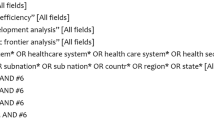Abstract
Increasing healthcare expenditures and other economic pressures mandate fundamental reforms of the healthcare system in Germany. The overall goal is restraint of costs while at the same time maintaining a high standard of medical care. Among all options, managed care represents a potential solution, since it combines financing mechanisms and a care delivery system under the control and direction of a single management entity. A core element of managed care is cost containment through structured guidance of healthcare providers and patients. This has the potential to provide a higher level of control and promote greater transparency in the healthcare system. However, it remains to be seen if it is possible to adapt elements of managed care from other countries to the German healthcare system.





Similar content being viewed by others
References
Albeck H. Decreasing financing possibilities and necessity of alternative application of scarce resources. In: Arnold M, editor. Managed care — cause, principle, forms and effects. Stuttgart: Schattauer Publishers, 1997: 93–107
Department of Health. Health in Germany. Bonn: Department of Health, 1995
Department of Health. Health report of Germany. Bonn: Department of Health, 1996
Hörnemann G. Administration in the health care system — a development suggestion. Stuttgart: Hartung-Gorre-Publishers, 1997
Beske F, Hallauer JF. The health care system in Germany. 3rd ed. Cologne: German Physician’s Publishers, 1999
Rychlik R. Physicians in the DDR — education, career and social position. Stuttgart: Enke Publishers, 1993
Harmsen H. Organisational development in the health care system of DDR since 1945. Hamburg, 1979
Statistical annual book of the DDR, 1989
Department of Health, Health reform 2000. Information, 1999
European Observatory on Health Care Systems. Health care systems in transition, Germany 2000 [online]. Available from: URL: http://www.observatory.dk/hit/hit.html [Accessed 2000 Nov 23]
Meyer-Lutterloh K. Future possibilities through managed care [in German]. Rheinisches Arzteblatt 2000; 1: 10–11
Eichhorn S, Schmidt-Rettig B, editors. Chances and risks of managed care. Stuttgart: Kohlhammer Publishers, 1998
Kovner AR. Health maintenance organizations and managed care. In: Jonas S, Kovner AR, editors. Jonas and Kovner’s health care delivery in the United States. 6th ed. New York: Springer Publishing Company, 1999
Benedek K. Domestication of managed care — model projects regarding managed care. Cologne: Project Mibeg Institute, 1999
Seitz R, König H, Graf von Stillfried D. Basics of managed care. In: Arnold M, editor. Managed care — cause, principle, forms and effects. Stuttgart: Schattauer Publishers, 1997: 3–25
Author information
Authors and Affiliations
Corresponding author
Rights and permissions
About this article
Cite this article
Rychlik, R., Güntert-Gömann, K., Kilburg, A. et al. Healthcare Reforms in Germany. Dis-Manage-Health-Outcomes 8, 305–312 (2000). https://doi.org/10.2165/00115677-200008060-00001
Published:
Issue Date:
DOI: https://doi.org/10.2165/00115677-200008060-00001




